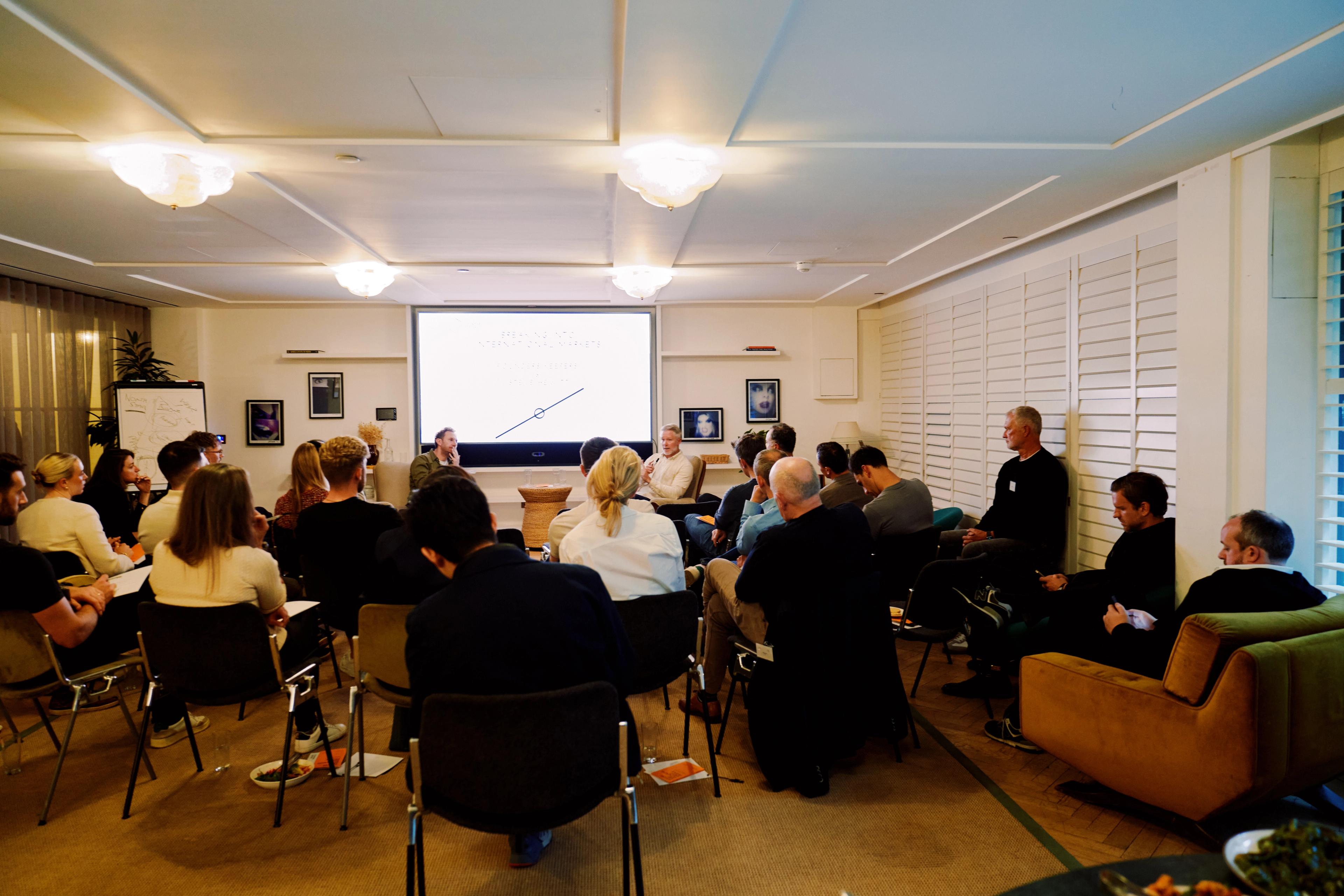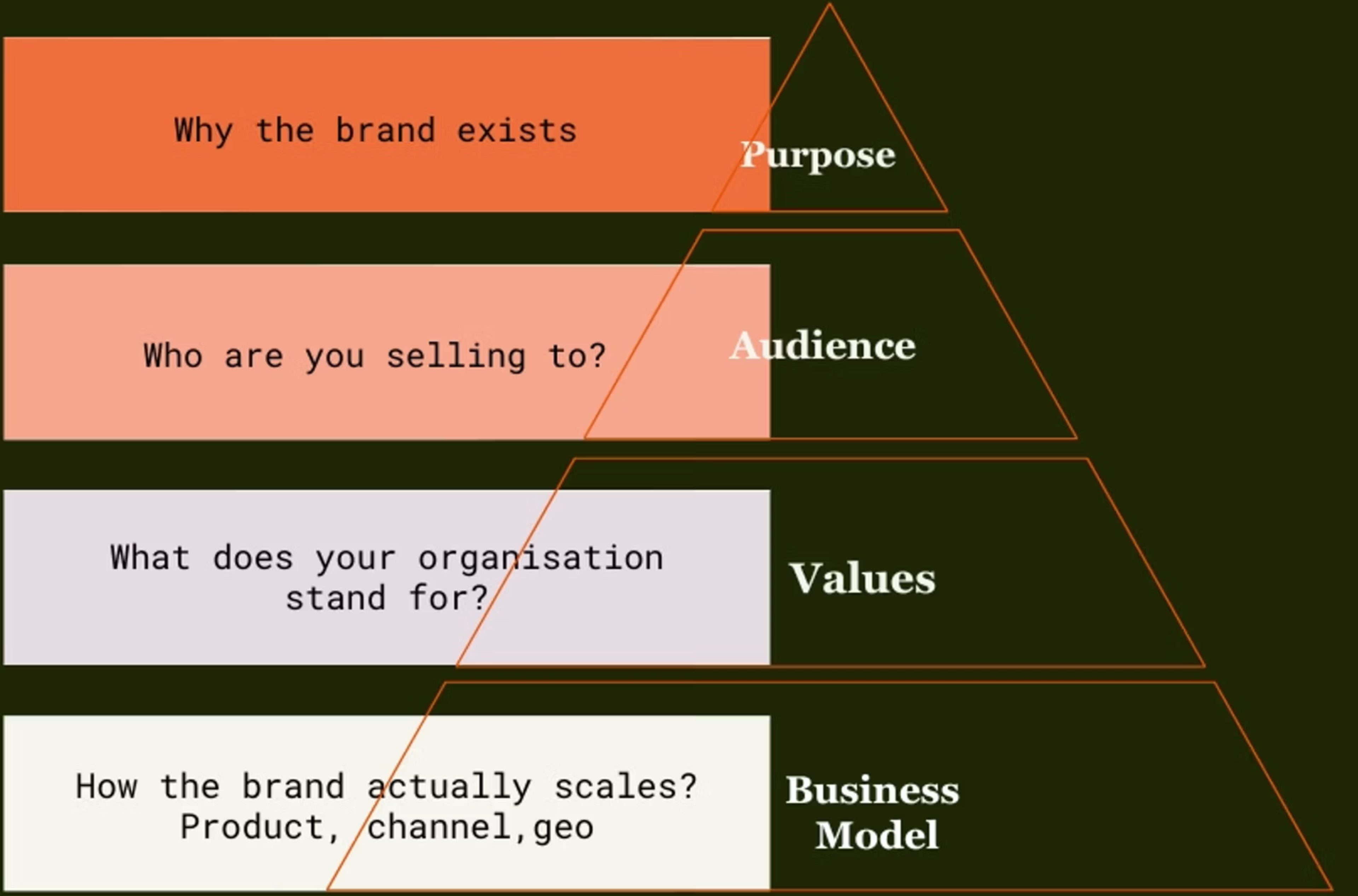International Expansion - Pivotal Lessons from Steve Hewitt, CEO Gymshark

International Expansion - Pivotal Lessons from Steve Hewitt, Former CEO / Executive Chair Gymshark
In a closed-door event hosted by Richard Segal & Jessamy Vero, Steve Hewitt (former CEO of Gymshark and Founder of Whanau), joined by Dave Parry (former CPeO, Gymshark) and Ed Priestnall (former Talent Director, Gymshark), led a high-impact conversation with ~30 consumer brand founders and CEOs.
The group unpacked the realities of international expansion—with a particular focus on the U.S.—sharing candid lessons on when to expand, how to preserve culture, and how to avoid strategic overreach.
From testing international markets to managing tariffs, preserving brand identity, and transitioning from founder to CEO, the key message was clear: growth requires discipline, not just ambition.

Steve Hewitt
Former CEO / Executive Chair, Gymshark
When Steve took over as CEO and shareholder of Gymshark in June 2014, the fitness apparel brand was just beginning its journey.
With a vision to revolutionise the industry, Steve steered the company from a company with £4 million in annual sales and seven employees to a global juggernaut with £500 million in sales and a team of over 1,000 within seven years. This remarkable growth was fuelled by the success of their sole revenue channel: www.gymshark.com.
Under Steve’s leadership, Gymshark achieved Unicorn status in September 2020, reaching a remarkable $1.5 billion USD valuation. This milestone came with the support of General Atlantic who joined as a minority shareholder.
After his exit from Gymshark, Steve joined the board of the clothing brand Passenger as a Non-Executive Chair (adding his expertise to another growing company) and embarked on a new venture with the founding of Whanau Advisory.
Dedicated to helping organisations navigate their growth and align their teams with a clear vision, Whanau Advisory is making waves in the consulting world. The firm also stands out for its commitment to giving back, donating a portion of its fees to Birmingham Children’s Hospital and St. Basils.
As Steve continues to drive innovation and growth, Whanau Advisory is set to reshape how businesses plan their futures while supporting charitable causes close to his heart.
1. Cut the Chaos: Scale with Clarity at Home First
Most founders are drawn to the shiny new thing, creating what Steve calls “magical chaos”. The CEO’s job is to remove that chaos. One key way to do that: establish a clear, scalable language inside the business that works for employee 500 as well as employee number one.
Founders must ensure they’ve truly optimized their home market before expanding internationally. The UK may be unfashionable politically, but it remains a cost-efficient, stable launchpad.
💡 “You shouldn’t scale abroad until you’ve scaled properly at home.”
2. The North star framework
Aligning Brand and Business

3. International Expansion: Simplicity Over Speed
Growth abroad shouldn’t come at the cost of coherence. Expansion increases operational complexity, and geography is the most complex growth lever. Start instead by maximizing growth via product and channel.
Key rules for expanding into new markets:
- Test and learn: Have a protected experimentation budget that doesn’t require immediate ROI. Try to create viral moments.
- Start with English-speaking markets to reduce cultural and operational risk.
Don’t use the same playbook everywhere. One well known beauty brand flipped its UK/US channel strategy for exactly this reason.
One cautionary tale: A UK brand sourcing from China grew to £25M in revenue—only to pause its U.S. operations due to 145% tariffs.
Profit is optional. Cashflow is not.
4. Preserving Brand Abroad: Flexibility is a Strength
Global success requires brand flexibility. Founders must decide how much of their identity can flex in new markets, especially when relying on retailers or partners. If you delegate the brand, ensure they can represent it as well as you would locally.
“Strong brand values matter but rigidity kills growth. Preserve the core, flex the execution.”
5. Operational Realities: Tariffs, Cashflow & Supply Chain
With new U.S. tariffs creating uncertainty, brands are being forced to diversify supply chains, delay tariff payments, and manage working capital tighter than ever.
A few approaches discussed:
- Holding inventory in Mexico to delay U.S. duties
- Using local 3PLs and warehousing to shorten cash cycles
- Spreading risk across more geographies
Still, many brands remain bullish on the U.S.—but success now demands creativity and contingency planning.
6. Investors: Alignment Over Capital
Founders were urged not to build a business solely for a financial event. Instead:
- De-risk where you can, don’t wait for the top of the curve
- Bring investors in for value, not just for money
- Treat investors like employees, no surprises, open communication
At Gymshark, 18 of 32 investor options were rejected for misalignment on culture. The takeaway? Only partner with those who understand your values and long-term vision.
7. Leadership & Talent: Scaling People Across Borders
Expanding internationally means expanding your culture, not just your footprint. This isn’t always easy. Gymshark, for example, found that values like “family” didn’t resonate equally in markets like Hong Kong.
Other key talent insights:
- Use nationals where possible for market understanding
- Flexibility at HQ is just as important as local adaptation
- US hires come at a much higher cost per head, but bring vital cultural insight
You should hire generalists first when you are early stage but then hire specialists - especially for lean landing teams.
And most importantly, founders must know when to step back.
8. When Founders should Transition from CEO
Most founders don’t make great CEOs long-term. The role requires strength across both product and operational strategy—skills many founders dislike or avoid.
Insights on the founder/CEO dynamic:
- Don’t bring in a best friend, hire someone better than you at what you hate
- Founders and CEOs must present a united front: “Disagree behind closed doors”
- Your impact as a founder will always be felt - but clarity around roles is essential
“Founders are brand custodians. They should ask: where do I add the most value now?”
Closing Thought
International expansion is not a default growth strategy—it’s a high-stakes choice that demands internal clarity, financial visibility, and cultural adaptability. For any founder looking to go global, the questions are no longer when or where, but how prepared you really are.
